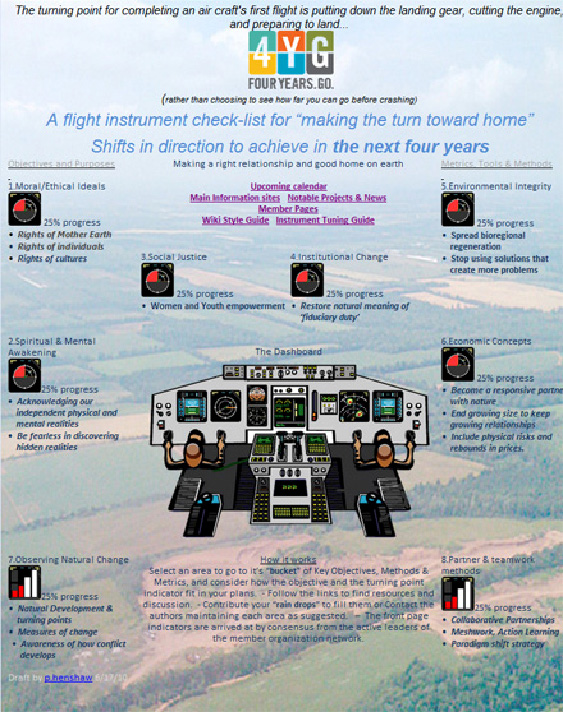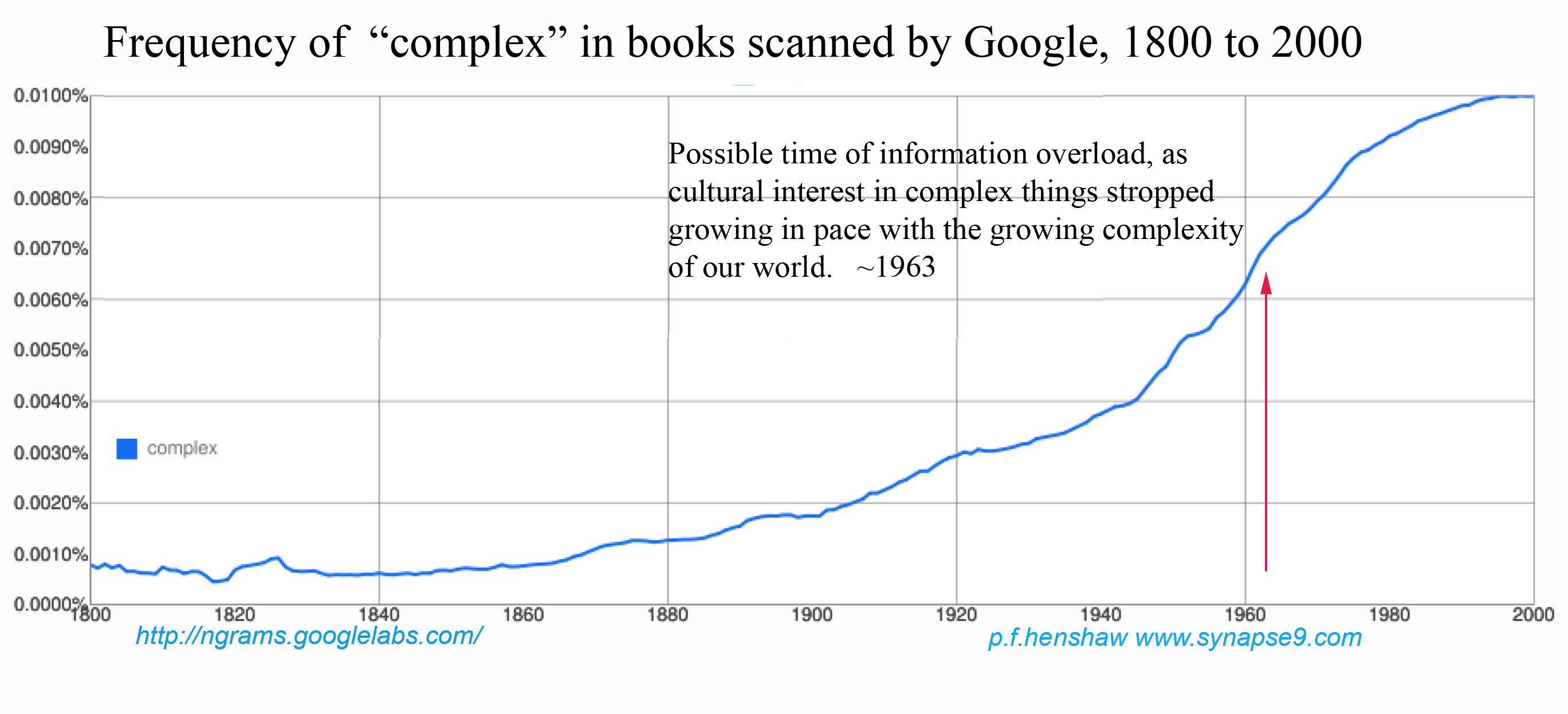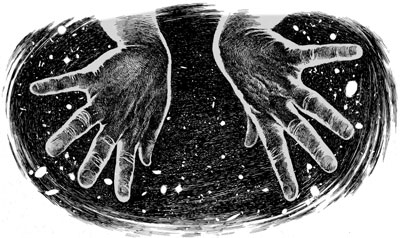a little “Evo-Devo” insight for the study of natural systems, and ourselves, based on thenew physics of development in natural systems.
In a phrase: Life begins when internal growth approaches an end, revealing your presence in a new environment… where making relationships rather than consuming your partners is more profitable.
From a simple mechanical behavior sense, all ecologies, organisms, societies, cultures, businesses and other environmental systems that survive their own growth, did not start with that plan to begin with. Life is indeed something that happens when you were planning something else.
Life begins in becoming responsive to others, a learning process, not a formula. Growth systems invariably begin with a model for endless multiplication, the same way cancers do.
That’s the universal start for natural systems that develop organization using energy. They first treat their environment as a resource for limitless growth, and then find out otherwise. Failing to do so, of course, is then your own failure and not nature’s.
Growth as a system of multiplying development, using something as a free resource for energy. It provides nature’s solution to the “chicken and egg” problem, repeated everywhere some new form of organization develops.
The parts essentially learn as they go, how to expand on their initial success. That exhibits an energy and resource management strategy, maximum explosive one-way use.
Life begins when that radical behavior radically changes, to become balanced two way use. Why this elemental sequence, clearly visible in the origin of everything we’d call “life” and lots more, isn’t a subject of science yet, seems like deep mystery. It’s evidently something about our ancient habit of thinking of world as being our explanations, and ignoring lots of things we plainly see but can’t explain.
Growth can arise from a circumstantial nucleus, like when a misunderstanding prompts a great new insight, or when a small eddy picks up energy till it becomes a great storm. Otherwise growth usually builds on some kind of seed left behind, containing a kind of map of starting organization from other forms of life in the past, that tells it how to respond to the inevitable limits of its initial process of exploding development.
The strategy in each case is one or another way of using free energy from the environment to build a system for releasing increasing surplus amounts of free energy, creating an explosion of new ways to consume its environment as a resource.
In initial “cancer phase” of maximizing the rate of growing consumption, the active process exploits it’s limited control of its environmental resources to multiply its control of its environmental resources. Starting from a single cell in the womb, growth considered as an experience for a fertilized egg, is first one of limitless expanding control of its dark universe of rich nutrients, an amazing string of endless luck in which every greater demand is met by ever increasing returns.
The chemistry evolving within a single cell multiplying in the womb initially has no need or means of sensing its external environment at all, except for it being a limitless response multiplier. It sees its long string of continually doubling resource demands being met by continually doubling resource returns (1) and that’s all, up to a point.
It’s what it then does at that point, where it has to respond to the greater world it has had no contact with before, that really counts. Something has to come from within to allow it to respond to entering its new wilderness that way.
Whether the mom or a friend can easily see that the resources available, to the “little cancer” inside there, are not going to be infinite is beside the point. Adults look at that question from the “other side” of having already answered it.
Our “objective” view is not the growing organism’s “subjective” view. As adults we’ve already given up our demand for limitlessly multiplying control of our environments… as a price to be paid in exchange for achieving life.
We chose, in some biological way, to change plans, and take the higher reward of becoming a temporary guest in an immortal community of other living things. It’s a better deal than staying in the womb to endlessly multiply and consume your host as a resource.
To understand the circumstance of the “little cancer” inside, the question becomes, “how does it know?”. It must have some way of sensing the diminishing returns approaching for its ever increasing need to control and consume its host.
Does its growth experience, on a cellular level, give it a practical basis for sensing the approaching “crunch time” and “change of life” that an outsider can readily see coming. As an organism it has to have one it seems.
It needs to successfully find how to tell all its cells to stop doubling somehow and prepare for the ultimate rejection by its host, to be ready to be forcefully ejected from the place that was so exceptionally fruitful for its “trillion cell” march as an endlessly multiplying nutrient economy, however natural it seemed to be.
That way of understanding the future would have to be in a language that all its cells understand, giving it considerable foresight, a material kind of body knowledge. It’s not the untested mind of the fetus that steers biological development.
The infant mind’s information needs and talents are for the next environment, not for knowing how to get things together to be ready for birth. It seems there is only one such possible internal body language available, and so evident and simple that it escaped our attention.
It’s the secret of what makes a fluid fluid, the “body language” that results in all stresses being equally distributed so every part senses exactly what’s going on with the whole. Chemically you could have hundreds of different kinds of stresses quickly telegraphing the state of the whole to every part.
Without that kind of internal body language serving as a multi-dimension “internet” to guide development, there would be no way to match a genetic code of particulars and the real dynamic approach of the ultimate rejection experience and need to begin exploring a new world.
Perhaps the newborn’s mind is not developed enough to feel birth as emotional rejection, but the message “go find your own lunch”, without any map of how or where to find it, is clearly there. It’s sort of the worst graduation exercise ever! An infant only finds out those things later, as its very small efforts at being outgoing are responded to, and it begins to explore its new world for itself.
Being born might be such a shock, though, that being ejected from the womb is what new born infants are crying about at first, just being forcefully pushed out and dropped into a completely alien environment.
All other kinds of graduations into unfamiliar new environments are a bit like that too, coming from outgrowing one environment and being plopped into another to get lost in. One is invariably unprepared, whether it’s traumatic or not.
If you study how any organism behaves at birth, or on graduating from one stage of development to enter a more complex world, most display a state of shock, and bewilderment as to what they’re supposed to do at first. A classic example, in addition to school graduations, is the behavior of newborn ants emerging from the nest in spring, seemingly profoundly directionless. Learning how to live proceeds slowly at first and then picks up a little speed.
What I’m trying to point to is the larger pattern, of course, that any opportunistic growth system begins its existence with a period of “endless” multiplying control of its environment, a simple life of gorging itself on its host, consuming its environment as a resource in ever bigger amounts. The brief chance to join in life then occurs as that ends.
Such an organism does not approach the option to become part of their new environment from hindsight. It can have no awareness of the “big picture” of what comes later.
During the initial growth for ecologies and economies as well as organisms and other natural systems that mature, the initial growth process has no experience other than growth, and no map of how or when to stop or how to form new relationships with other things than to consume them.
All any growth system has to work with is its “body language” of sensing and communicating the emerging features of its approaching dead end. So, what grows into Life? It seems to be for individuals to meet that universal individual challenge of life, learning to switch gears, sensing diminishing returns on one thing as a motive to grope around and learn others, or quit.
That challenge met by every new form of life is the same challenge and quandary we are now facing with the world economy, our “organism of the whole”. When you see the resource use data it’s very clear that humanity has been acting as a single unified global organism for maximizing its growth (2).
Up to 2008, the world economy had been working smoothly for many years as a whole, with all its parts cooperating to operate on the start-up “cancer plan” for using up the earth as fast as possible, forever. Now it seems we need to make some new choices, or end up having to quit.
We have no prior history or experience for it, though it the interesting part. So we have no solid basis for knowing it’s a choice between achieving relative immortality as a society, as a partner in a larger environment, or as an economic organism to die. All we have is the signal from nature to “go look” for something else to do.
Will we?? I doesn’t seem so in so many ways. Failing to make the right choice seems to be the rather clear perennial habit of human history, too. Humans pride themselves in learning from mistakes, except for this big one.
So many prior complex human societies before ours met the same challenge of great start-up success, only to fail to join life by becoming part of their own environments to become relatively immortal. That also meant that none of the quite poignant stories of our past civilizations seem to leave clues as to what the better choice would have been (3).
It also clearly says that our own ancient stories are much more likely a map of how to fail to meet the challenge of life, lead by the horribly failed strategy of “try harder” when the whole strategy is failing… for example. We have failed so often it seems, history is more a record of the wrong moves, not the right ones.
For the cells of any new form of life, like people struggling to stay afloat in this erupting world economy, there’s really nothing explicit to go on from the experience, except one thing. There’s only the very feint tell-tale signs of body language, of diminishing returns being communicated around through the relationships that once were more responsive to you…
There are some obvious things, like how investors adding their profits to accelerate a definitely dead end process could be quickly changed if agreed to, but then what?? Our experience doesn’t tell us, because the challenge of life is that experience doesn’t tell you.
When new forms of life meet the challenge and succeed, though, the cells do somehow read the body language of the growth experience and “vote themselves off the island” of putting ever more effort into dead end paths, discovering instead that the felt rejection is a door to a whole new experience. The reward is exploring the new environment to find new partners.
Organisms that all begin like cancers, but then choose life somehow, join the mainland of others who made it before them, unaware that that larger community of life even exists. They switch to living in a big world by co-operation rather that cling to their little world of subjugation.
They find and construct niches to be secure in exclusive zones, but don’t consume their energy trying to taking over the niches of all other organisms… It clearly displays a response of avoiding efforts to make conflict with others that wouldn’t pay, demonstrating basic responsiveness.
As they themselves come alive in finding how to interact with others in the new environment their growth brings them into they find much of what had seemed to be passive resources to be becoming active partners in new relationships. Their immature growth by consumption turns into a story of successions, looking for the comfortable limits of any one stage.
Who would want the pinnacle of their life to be nothing greater than the 1st stage? That would be like being satisfied with becoming the biggest bully in the nursery school, and never moving on along through the greater challenges of a growing and maturing as a child and then adult.
That same story of growth as a stage leading to new environments is what makes any individual life an exciting, challenging and rewarding experience. Nature arranges for that, in part, by having us come to the end of any growth phase quite unaware of the challenges of the next.
Organisms, meet each stage of growth as if blind, making sure that every phase of life starts with a completely fresh take on the perennial voyage nature has to share with all. Starting blind is evidently part of her way of teaching emerging forms of life how to see, by going outside yourself to explore the rest of life.
Meeting the future can be somewhat anticipated, but the particulars remain invisible both because one’s own experience doesn’t tell you about the experience of others, nor about the environments into which your growth will take you, nor the partnerships you’ll find there, nor how you will add to them. As for our economy, its experience shows it no reason at all not to just keep consuming its environment, that could become its partner in a far richer life and key to a relative immortality.
All it knows is its already richly rewarding existence of multiplying as a perpetual cancer on the earth,… There’s no real basis or prior knowledge for how it should respond. It’s the perennial individual challenge of life, that every form of life has to meet by itself and on its own. There are just some feint signs that the old plan may not continue to pay.
Notes
1) In a 9 month human gestation period, the single fertilized cell doubles about 42 times, or as if about once every 6.5 days, making a newborn ~4 trillion cells before birth.
2) World GDP, energy use & efficiency, discussed in The #1 Issue in Sustainability and links from there
3) Einstein, Keynes, Boulding and Jacobs – where was the first and original tower of Babel



